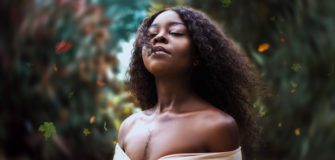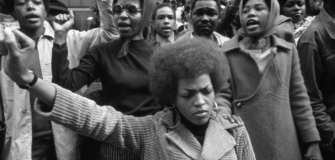How My Invisible Disease Forced Me to Advocate for Myself
Share
I will never forget going into the doctor’s office for a checkup and walking out with life-changing news. In the midst of living my best single life – great job, beautiful home, and more I.N.D.E.P.E.N.D.E.N.T. than Lil Boosie described – I was informed, “You’re going blind. You already are in your left eye.”
For a moment, I stopped breathing. Sure, I wasn’t dying but in that moment my dreams did. Dreams of seeing my future husband across a room and knowing he was “the one”, daydreams of my upcoming trip to Brazil, dreams of future kids, career, you name it. In that moment, I grieved things I loved and things I may never see or experience. As a woman who always had answers, I walked out with only questions.
Though I could write a book about my journey, in short, it was exhausting, emotional, and radically changed my life – for the better. Reflecting back, now as a married woman (full vision intact), everything I learned in that season is helping me manage my sexual health and journey to motherhood. Maybe the lessons I learned can bless you too, without the whole blindness thing:
-
- Listen to your body, don’t ignore the “little things” – I remember driving to my parents’ house and briefly noticing the freeway sign seemed fuzzy. Initially I chalked it up to sunshine and dirty glasses. Something was wrong and my body tried to warn me. Yet, I waited for another little thing to pop up before getting my eyes checked. Never again. I don’t wait for multiple signs before I make an appointment with a medical professional, ain’t nobody got time for that. After my cornea transplant, I worked with a naturopath for a year to better understand my body and female hormones so it’s easier for me to quickly recognize when something is off. And do something about it, immediately.
-
- Search for doctors with at least the same effort as a hairdresser – Now ya’ll know, we can’t just let anybody to do our hair, it’s not worth the risk to walk out lookin’ crazy (among other outcomes). So why do we take Dr. Google’s advice and go to the first MD at the top of the search results?!? Nah. After my diagnosis, I met with multiple, vetted specialists before committing to a treatment plan that was right for me. Doctors are humans too. Their singular, lived experience informs their patient care approach. I learned the hard way it was impossible for one person to know everything and have all the answers. I now consult 3 doctors on any one health issue then compare their answers before moving forward. What is consistent about their medical advice? What isn’t? And why? Then I make my decision about who to trust with my care and how I want to move forward.
- Give yourself grace, let your squad help – I recall bursting into tears a few weeks after my transplant surgery because I tried and failed to attend a family event one night. Eye patch and all, I was ready to go in my heart and my body couldn’t do it. I was upset because my eyes wouldn’t stay open long enough to drive myself and I felt bad asking for a ride. On top of feeling incapable of getting myself there, I felt worse for ‘letting everyone down’. My therapist asked an enlightening question, “Do you think missing this one event erases all the other great things you’ve done?” – the answer was no. From that single incident, I’ve carried fourth two incredibly valuable lessons: 1) I cannot do everything myself, and that is okay. 2) Letting people help doesn’t make me weak, it makes me strong. I now bring an ally to nearly all my doctor appointments, so they can catch what I might miss. Sometimes they help me prep so I walk in equipped with questions and information. Other times they offer a different interpretation of how I heard the information. Either way, I feel empowered to make an informed decision because I have the support and perspective of someone who cares about me.
I didn’t ask for the genetic disease that causes blindness, but I’m so grateful for what I learned and gained because of it. Up until this diagnosis, I never had health issues. Now, because of my diagnosis, I approach my health and doctors with a ferociousness I never knew I had.




Follow Us